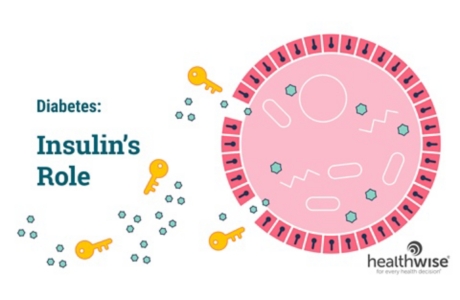Overview
What happens when you are sick
If you have diabetes, other illnesses can make your blood sugar go up. This can be dangerous. When you're sick with the flu or another illness, your body releases hormones to fight infection. These hormones raise blood sugar levels. They also make it hard for insulin or other medicines to lower your blood sugar.
Sick-day guidelines
Work with your doctor to write a sick-day plan for how to help prevent high blood sugar when you're sick. Keep your plan in a handy place, and let your family know where you keep the plan.
Here are some general sick-day guidelines.
- Take your diabetes medicines as usual.
- Keep taking your diabetes medicine, even if you vomit and have trouble eating or drinking.
- If you are vomiting and can't take your medicine, call your doctor. You may need to adjust your medicines.
- Write down the diabetes medicines you've been taking. Note if you have changed the dose based on your sick-day plan. You can give this information to your doctor if you need to call.
- Keep eating and drinking.
- Try to eat your normal types and amounts of food. Drink extra fluids to prevent dehydration. Ask your doctor about how much and how often you should eat and drink when you're sick.
- A general guideline is to try to eat or drink 50 grams of carbohydrate every 3 to 4 hours. For example, 6 saltine crackers, 1 cup (8 ounces) of milk, and ½ cup (4 ounces) of orange juice each have about 15 grams of carbohydrate. Your doctor may suggest more or less carbohydrate.
- If your blood sugar level is higher than the level your doctor recommends (for example, 240 mg/dL), drink extra liquids that don't contain sugar, such as water or sugar-free cola.
- If you can't eat your usual foods, drink extra liquids, such as soup, sports drinks, or milk. You may also eat food that's gentle on your stomach, such as bananas, rice, crackers, gelatin, or applesauce.
- Check your blood sugar.
- Test your blood sugar at least every 3 to 4 hours. Check it more often, even through the night, if it goes up fast.
- Take insulin if your doctor told you to do so. If you don't have a sick-day plan for taking extra insulin, call your doctor for advice.
- Do ketone testing if needed.
If you take insulin, do a test for ketones, especially when you have high blood sugar. Some home blood sugar meters can also measure blood ketones.
- Be careful with over-the-counter medicines.
Don't take any nonprescription medicines unless you talk to your doctor first. Many nonprescription medicines can affect your blood sugar level.
- Know when to contact your doctor.
Minor illnesses in people with diabetes (especially children with type 1 diabetes) can lead to very high blood sugar levels and possible emergencies. When children are sick, watch them closely for signs that they need medical attention right away.
- Your doctor will tell you what signs to watch for and what blood sugar level they recommend.
- Keep your doctor's contact information handy. And be sure you know how to reach your doctor at night or on weekends.
Related Information
Credits
Current as of: October 2, 2023
Author: Healthwise Staff
Clinical Review Board
All Healthwise education is reviewed by a team that includes physicians, nurses, advanced practitioners, registered dieticians, and other healthcare professionals.
Current as of: October 2, 2023
Author: Healthwise Staff
Clinical Review Board
All Healthwise education is reviewed by a team that includes physicians, nurses, advanced practitioners, registered dieticians, and other healthcare professionals.


